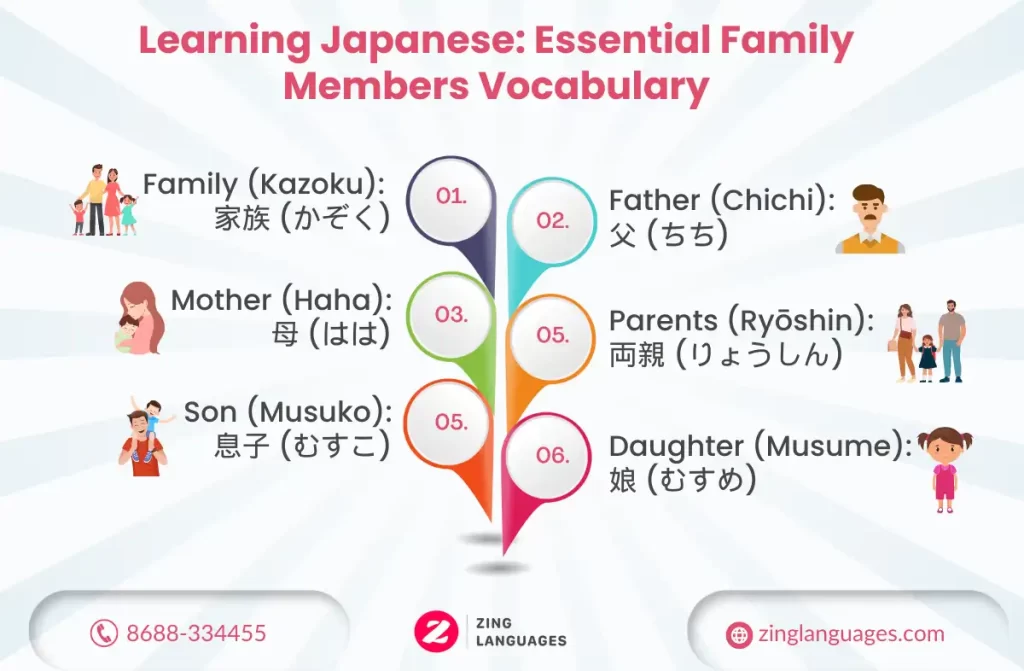Family members in Japanese language, learning a new language is an exciting and rewarding endeavour, opening doors to new cultures and connections. When it comes to learning Japanese, understanding the words for family members is an essential building block for effective communication.
Family holds a special place in Japanese culture, and the language itself reflects the significance of these relationships. In this blog post, we’ll take a deep dive into the vital vocabulary associated with family members in Japanese.
This knowledge will not only enhance your everyday conversations but also provide you with a more profound insight into the culture and society of Japan.
Language is a powerful tool for fostering connections, and understanding family words in Japanese will help you establish stronger bonds with native speakers. Whether you’re discussing your immediate family, extended family, or in-laws, these words will be your key to clear and effective communication.

Why is understanding family members’ vocabulary in family members in Japanese language?
Understanding family members’ vocabulary in Japanese is important for language learners for several reasons:
Cultural Understanding
Learning family-related vocabulary in Japanese helps learners gain insight into the Japanese culture and societal values. Family members in Japanese language are highly respected and play a significant role in Japanese society.
Communication with Native Speakers
If you ever interact with native Japanese speakers, having a grasp of family-related vocabulary is crucial for effective communication. You may need to discuss your own family, inquire about others’ families, or express your feelings towards family members
Politeness and Respect
Japanese culture places a strong emphasis on politeness and respect family members in Japanese language use. Using the appropriate familial terms and honorifics (like “-san” or “-sama”) when referring to family members or someone else’s family members is a sign of respect.
Social Interaction
Knowing family-related vocabulary also helps in social settings and when making friends in Japan. By understanding these terms, such as addressing family members in Japanese language, you can engage in conversations about family matters, which can be a common topic of discussion among friends and acquaintances. It not only enriches your language skills but also enhances your ability to connect with others on a personal and cultural level.
Understanding Media and Literature
If you have an interest in Japanese media, literature, or popular culture, understanding family-related vocabulary, including terms for family members in Japanese language, is essential. Many Japanese novels, TV shows, and movies revolve around family themes, and being familiar with these terms enhances your comprehension and appreciation of such content. This knowledge allows you to better connect with the characters and storyline, providing a more immersive experience in the rich tapestry of Japanese storytelling.
Travel and Daily Life
When traveling in Japan, you may encounter situations where knowledge of family-related vocabulary can be helpful, such as understanding signs, addressing people respectfully, or making inquiries about family-related services or customs.
Personal Relationships
If you have personal connections with Japanese individuals or are in an intercultural relationship, understanding family vocabulary, including terms for family members in Japanese language.
Read also: Japanese Classes in Bangalore
Japanese Family Vocabulary:
Immediate Family
1. Father – お父さん (Otousan)
In Japanese, “father” is “お父さん” (Otousan). It’s a term used with respect when addressing your dad. In more informal settings, you might hear “父” (Chichi) being used, highlighting the nuances within family words in japanese.
2. Mother – お母さん (Okaasan)
For “mother,” the Japanese term is “お母さん” (Okaasan). Similar to “Otousan,” this is a polite and respectful way to address your mom. A less formal word for “mother” is “母” (Haha).
3. Brother – 兄 (Ani) / 弟 (Otouto)
Japanese distinguishes between older and younger brothers. “兄” (Ani) is used for an older brother, while “弟” (Otouto) is the term for a younger brother.
4. Sister – 姉 (Ane) / 妹 (Imouto)
Just like with brothers, Japanese has specific words for older and younger sisters. “姉” (Ane) is used for an older sister, and “妹” (Imouto) refers to a younger sister.
5. Son – 息子 (Musuko)
In Japanese, a “son” is referred to as “息子” (Musuko).
6. Daughter – 娘 (Musume)
Similarly, a “daughter” is known as “娘” (Musume) in Japanese.
These are the core family member words you’ll need to communicate effectively about your immediate family in Japanese.
Extended Family
1. Grandfather – おじいさん (Ojiisan) / 祖父 (Sofu)
The term for “grandfather” in Japanese is “おじいさん” (Ojiisan) in casual or informal settings. If you need a more formal word, “祖父” (Sofu) is the appropriate choice.
2. Grandmother – おばあさん (Obaasan) / 祖母 (Sobo)
For “grandmother,” you can use “おばあさん” (Obaasan) in everyday language. If the situation calls for formality, “祖母” (Sobo) is the term to use.
3. Uncle – おじさん (Ojisan) / 叔父 (Oji)
To refer to an “uncle” in Japanese, you can use “おじさん” (Ojisan) in casual contexts. When formality is required, “叔父” (Oji) is the word to choose.
4. Aunt – おばさん (Obasan) / 叔母 (Oba)
“Aunt” is “おばさん” (Obasan) in everyday language, while “叔母” (Oba) is the formal term for an aunt.
5. Cousin – いとこ (Itoko)
In Japanese, the term “いとこ” (Itoko) is used for cousins, both male and female.
6. Nephew – 甥 (Oi)
To describe a “nephew,” you would use the word “甥” (Oi) in Japanese.
7. Niece – 姪 (Mei)
Conclusion
Mastering essential family members in Japanese language vocabulary is a pivotal step in your language journey. These words not only enable effective communication but also provide deeper insights into Japanese culture, where family plays a central role. By familiarizing yourself with these terms, you’ll not only enhance your language skills but also forge stronger connections with native speakers, enriching your experience of Japan and its traditions.
Check out Various Japanese Language Test.




